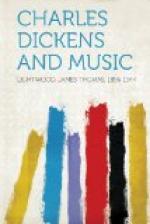‘You know forty-seven
songs,’ said the man, with
a gravity which admitted of
no altercation on the
subject. ‘Forty-seven’s
your number.’
And so the poor little maid
had to keep her rough
companions in good humour
all through the night.
Then Tiny Tim had a song about a lost child travelling in the snow; the miner sang a Christmas song—’it had been a very old song when he was a boy,’ while the man in the lighthouse (C.C.) consoled himself in his solitude with a ‘sturdy’ ditty. What was John Browdie’s north-country song? (N.N.). All we are told is that he took some time to consider the words, in which operation his wife assisted him, and then
began to roar a meek sentiment
(supposed to be uttered
by a gentle swain fast pining
away with love and
despair) in a voice of thunder.
The Miss Pecksniffs used to come singing into the room, but their songs are unrecorded, as well as those that Florence Dombey used to sing to Paul, to his great delight. What was the song Miss Mills sang to David Copperfield and Dora
about the slumbering echoes
in the cavern of Memory;
as if she was a hundred years
old.
When we first meet Mark Tapley he is singing merrily, and there are dozens of others who sing either for their own delight or to please others. Even old Fips, of Austin Friars, the dry-as-dust lawyer, sang songs to the delight of the company gathered round the festive board in Martin Chuzzlewit’s rooms in the Temple. Truly Dickens must have loved music greatly himself to have distributed such a love of it amongst his characters.
It is not to be expected that Sampson Brass would be musical, and we are not surprised when on an occasion already referred to we find him
humming in a voice that was anything but musical certain vocal snatches which appeared to have reference to the union between Church and State, inasmuch as they were compounded of the Evening Hymn and ‘God Save the King.’
Whatever music he had in him must have been of a sub-conscious nature, for shortly afterwards he affirms that
the still small voice is a-singing
comic songs within
me, and all is happiness and
joy.
His sister Sally is not a songster, nor is Quilp, though he quotes ‘Sally in our Alley’ in reference to the former. All we know about his musical attainments is that he
occasionally entertained himself with a melodious howl, intended for a song but bearing not the faintest resemblance to any scrap of any piece of music, vocal or instrumental, ever invented by man.
Bass singers, and especially the Basso Profundos, will be glad to know that Dickens pays more attention to them than to the other voices, though it must be acknowledged that the references are of a humorous nature. ‘Bass!’ as the young gentleman in one of the Sketches remarks to his companion about the little man in the chair, ’bass! I believe you. He can go down lower than any man; so low sometimes that you can’t hear him.’




